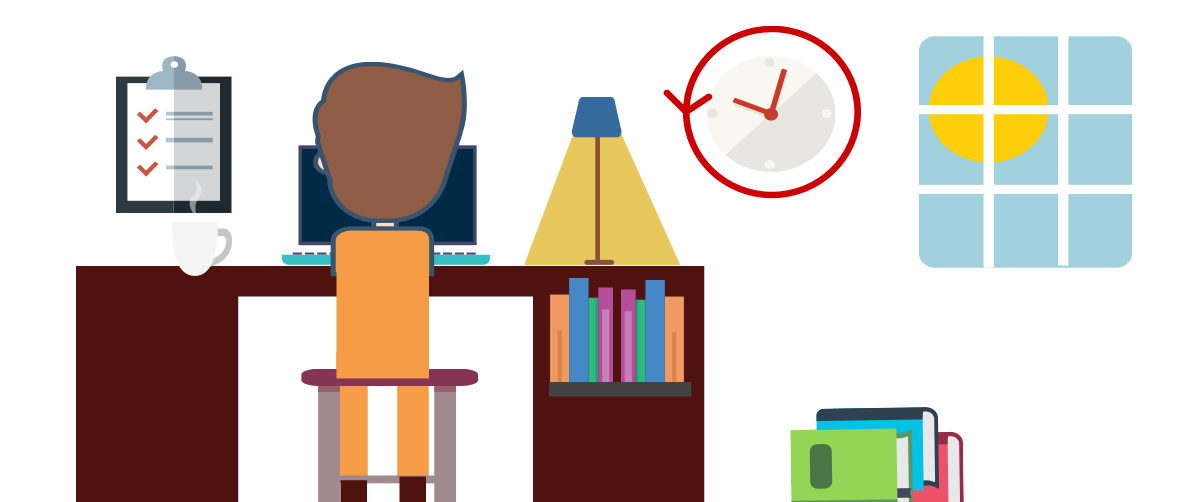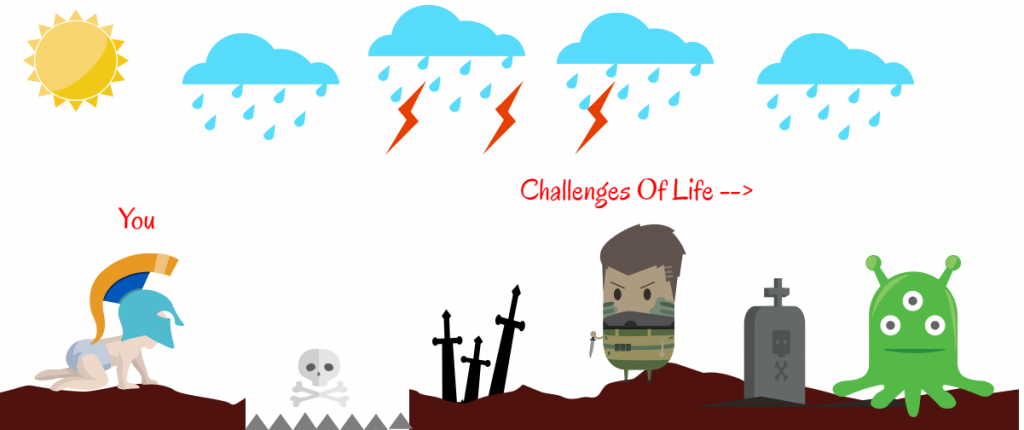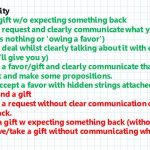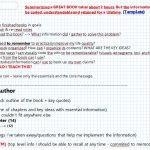“Don’t rely on others to supply what you need to know. Figure out what you want out of life and teach yourself how to get it.”
Unprepared.
That’s the emotion I’d say is governing my thoughts right now.
See – I’m pretty close to graduating at this point and find most of the stuff I’ve picked up over the years in my school to be completely and utterly useless. The last three months I’ve written 20k+ words on my thesis to meet “length” quota’s, worked 350h+ for free for my final internship and yesterday I took a two hour train drive for a required class about how to make a table in a word document.
Literally.
And really? It frustrates me.
I’m being told how to run my life by people who don’t have any fucking clue what they’re talking about (in my eyes). It makes me resent people who claim my time for their own agenda or evaluate me based on their “expertise” without a showing track record, claiming that ‘experience’ or ‘age’ made them wise.
Cool fact: It’s possible to sit around for a long-ass time and don’t learn any useful life knowledge. Heck, it’s even common.
So, I believe it’s good policy to ignore everyone who doesn’t have the results you’re looking for. People have incredibly low standards of the advice they take these days. I even encourage you to be wary of mine;
Here are my “stats” atm:
- Social: Close friends = 2, average meet-ups/week = 0.75
- Dating: Girls slept with = 9, last time sex: beginning august 2016
- Wealth: Money in bank = €650 + 300 in savings, assets/investments: none, live with my mom (financially dependent)
- Health: 78.5kg, 8% body-fat, 183cm, average workouts/week = 2.6, average energy = 5.9
I’m just saying that you should take into account the references people have, before listening to them. Wannabe’s are simply not worth the time.
I wish more people actually reflected on their achievements before giving advice on certain topics.
Or at least stating that they might not be an expert on the things they’re saying.
“If the person has what you want, listen to them. If they don’t have what you want, they should be ignored.”
— Simon (@BasicGrowth) May 10, 2016
Getting off-track here, back to the school issue..
Anyway, It’s nothing new to say schooling is dated and sucks. But it’s one thing to see the problem and bitch about how things aren’t going your way (a fools choice), it’s another to take responsibility for it and proactively steer your life in a better direction (great choice).
Always focus on solutions, never allow yourself to dwell on problems
Like Chris from good looking loser said in one of his posts on negativity;
when you’re negative, nothing changes and nobody cares.
So.
Let’s make this post really practical – shall we?
I’ve been thinking about what I’d do differently if I could start college all over again. And hence I’ve searched the most essential life skills to learn and how I would got about learning those given my current knowledge.
In this article I’m going to talk about the most essential life skills I believe anyone should master. The ones with the lowest opportunity cost and highest return on investment. This way you won’t spend a lifetime chasing useless knowledge that doesn’t impact your life quality (which many do)
Like Seneca said;
Even if you had a large part of your life remaining before you, you would have to organize it very economically to have enough for all the things that are necessary; as things are, isn’t it the height of folly to learn inessential things when time’s so desperately short?
————————————————————————
Why Learn These Essential Life Skills?
I believe times are going to get tougher in the future.
With the rapid-growing evolution of tech, increasing global population and shrinking fossil fuels, the means to life (water, money, food, energy, security, … ) will get scarcer and many jobs will be automated.
Don’t be fooled by people stating that tech will provide many more jobs. It will replace a lot more and the new job openings will mainly be for highly-skilled people.
The only way to (partially) defend yourself from that, is learning things that exponentially increase your life quality.
The main elephant in the room is naturally economic security. In this area you’ll outshine your competitors if you’re able to do work that’s hard to replicate (whether by deep expertise or a combination of unique skills)
Let me restate that: Being able to do something that no-one else can do will make you indispensable/irreplaceable in the future economy. Cal Newport is his most recent book “Deep Work” states that;
The people that will thrive in the future economy will be
- Highly tech-skilled workers (people who are good at working with machines)
- Superstars (the top percentile of every industry. It’s a ‘winner-take-all’ market out there. Especially considering digital skills where you directly compete with the whole world)
- Owners (people with enough capital available to invest, preferably in high-level tech startups which commonly have unprecedented ROI)
Other trends I’ve picked up is that the middle, working class (regular jobs) is slowly loosing its footing. Companies just don’t want the hassle anymore of having employees and would rather outsource everything to freelancers on a periodical basis instead of giving full salaries. James Altucher, writer of “Choose Yourself” states in one of his podcasts with Tim Ferriss that;
the middle class is slowly being fired or demoted from their jobs – and it’s a horrible thing.
This idea that the corporation is going to take us from cradle to grave from the time we leave high school or college to the time we retire and “the corporation will take care of us” [is wrong]
[Talking about companies who outsource their work] If you look at the rise and their revenues and compare that to the rise and revenues of other companies in the stock market, there’s no comparison. These companies are going up over the past five years, 300-400% in revenues because it’s not just people outsourcing secretaries.
It’s companies like the major accounting firms, law firms, businesses who are outsourcing vice president level functions to agencies because they don’t want to deal anymore with having employees because it’s too much risk if the economy goes down or too much risk with changing regulations.
First people wanted that lifestyle [referring to the four hour work week-lifestyle], now people have to learn that lifestyle.
I don’t believe it’s pessimism but realism to better prepare for the future and am convinced of its urgency (happy note: the competition isn’t great for high-level places though. Your competition is watching 9gag, checking facebook or catching a magikarp right now).
It’s just overall something I’ve been thinking about, especially the current demographic growth has peeked my interest in preparing better for the future as “temperature rises”. In another podcast with Joe Rogan, Tim Ferriss stated that;
“The more I look at the reality of how people behave in situations where there are scarce resources, especially water, I don’t think it’s that crazy of an idea to have 6 months worth of canned food. I think it’s cheap ensure”
Further he states that;
People behave as well as their circumstances allow them to.”
If I understand human psychology well enough (which I believe I do), I agree with that fact. Basically; when pressure rises and resources become scarce, people freak out and switch to “survival”-mode. Lord-of-the-flies-type shit.
There are very brilliant, very wealthy people who take this very far (think underground EMP-proof bunkers) to have a contingency for this Malthusian-esque type of situation. The demographic pyramid simply won’t hold.
Maybe some of this is media-fueled lunacy backed by a confirmation bias or there’s some realistic, proven solution I’m missing (notice the emphasis before commenting) – I don’t know for sure.
And I’ll never be.
Despite all that – the following advice is something I believe you should take regardless what the future holds. It’s IMO the best course of action for any 20-something.
I hope you’re somewhat convinced by this point, since I’ll be diving in some pointers on learning these skills.
How To Learn These Essential Life Skills?
Before I start – and probably the most boring part of this whole post is stressing the importance of practice & repetition. And then I don’t mean putting effort in once or twice a week, but if you’re serious about improving anything and want to see results from it you’ll have to dedicate a focused amount of time to it over a period of time. Your neurons need time to build.
Skills sharpen slowly and dull quickly
Making new neural connections is like carving your way through an overgrown jungle – you need to regularly clean it up/traverse it (aka recalling) or the path will fade out again and become overgrown.
Skills and other complex activities break down when not actively practiced (my writing could probably be better than it is now – then again, my programming is pretty on-point**)**
Forming neural pathways (memorizing stuff) takes time to build. Synapses grow stronger by frequent usage and spreading in time. (Same reason why “cramming” before tests is pointless in the long-run)
Enough talk – let’s get into what you should learn to really excel at life;
Note: Leave suggestions for other skills/learning methods to accelerate the ones mentioned in the comments below and I’ll add them to this post!
What Essential Life Skills To Learn?
**1) Emotional Intelligence
**
I cheated (and will be doing more of that!) – these are four skills all combined. You’ve probably heard about the fad that is “emotional intelligence” and quotes like “EQ is a more important predictor for career success than IQ” and that kind of fairy unicorn stuff, right?
Well, it’s true – It has huge implications for you overall life quality and can have more impact on your life than any other skills;
What should you learn?
EQ consists out of;
- Self knowledge (knowing your own strengths, weaknesses & personality to shift towards optimal conditions. Many people build their career on weakness which makes them resent their life later down the line. Build your life on a rock-solid foundation of who you really are.)
- Self regulation (controlling emotions/instincts for better long-term solutions – this has wide applications like food choices, money management, directing sexual energy, self-motivation, anger, forcing yourself through unpleasant circumstances, …)
- Social awareness (It’s basically the ability to see the world through the eyes of others, how does the other person feel & what does he say = empathy)
- Social regulation (these come down to your overall social skills, how good are you at making other people feel good, understood, at ease and express yourself so they understand you. These include your written and verbal communication skills.)
- Laws of reciprocity (Probably didn’t expect this one eh? You need to understand the dynamics between cooperation in humans and the psychology behind it. Great feats of societal stresses occur when reciprocity is expected yet not provided.)
How should you learn it?
- Self knowledge
- Find your own strenghts through self-analysis, reading Managing Oneself, Strenghtsfinder 2.0, doing personality tests like the MBTI and Big Five Test****. Here’s an overview of everything I know about myself, to give you an idea for its uses and how you can learn more about yourself.
- Self management
- Build up constructive habits in routines (dressing well, eating healthy, reading daily, working out regularly, tracking income & expenses, morning & evening routines, …). Many are laid out in my free ebook “The Life Guide“.
- Learn how to effectively control your emotions. This could be a post by itself but what I do is make an IF > THEN plan to deal with the most common negative/blocking emotions I feel. Here is an example of how I routinely fix negativity. These should be as automated as possible.
- Find a system that allows you to plan your life, correct yourself when you’re off track through reflecting and re-set new objectives when achieved. Starting the 5 minute journal is HIGHLY recommended for this.
- Reading: Do The Work by Stephen Pressfield, The One Thing by Gary Keller and The 7 Habits Of Highly Effective People by Stephen Covey
- Social awareness
- Social awareness = Social experience (it comes with time). Do this by having a regular (2-3/week) social hobby/meetup with friends, chatting to strangers online, making more small talk everywhere. Analyze the words and body language of that person and try to think about how they feel and what they mean. I’ve written another (older) post on social skills.
- Social regulation
- Social regulation = Social experience (it also comes with time). Same way you practice social awareness but this time you try to steer the behavior/feelings of the other person where you want them to go and influence them.
- Laws Of Reciprocity
- Basically this means that nothing is truly free and nothing is really unconditional. There’s an unwritten societal code you need to be aware of when it comes to giving/taking favors and it would be wise to take into account the following rules. I’m probably missing a few though;
Laws Of Reciprocity
Additional reading: Emotional Intelligence 2.0, How To Win Friends And Influence People by Dale Carnegie, Social Skills Guidebook by Chris MacLeod and Crucial Conversations (for diffusing/addressing difficult subjects)
2) Career Skills
Yeah – that’s also a collection of skills, but here’s what I mean by that; The skills required to financially support yourself for a lifetime. For pretty much everyone these are the most important. If you don’t make enough money, your life will suck, period.
Money allows you to eliminate all many negative aspects from your life to focus on things you really care about (rise to the top of maslows’ hierarchy of needs), increase your happiness (up to 6000 dollar log income) and allow for a wide array of diverse interests. It’s critical to acquire this and probably the most important from this blogpost to take away. People who are financially set have all the time left to pursue their other interests and spent their life on activities they actually find meaningful.
Josh Kaufman – surfing
DHH – racing
Tim Ferriss – hunting
DO NOT be fooled into the “follow-your-passion/do-what-you-love” mainstream self-development crap. Follow this career advice instead.
Fuck passion and fuck fun.
What should you learn?
- Build up expertise in 1 industry & learn economically
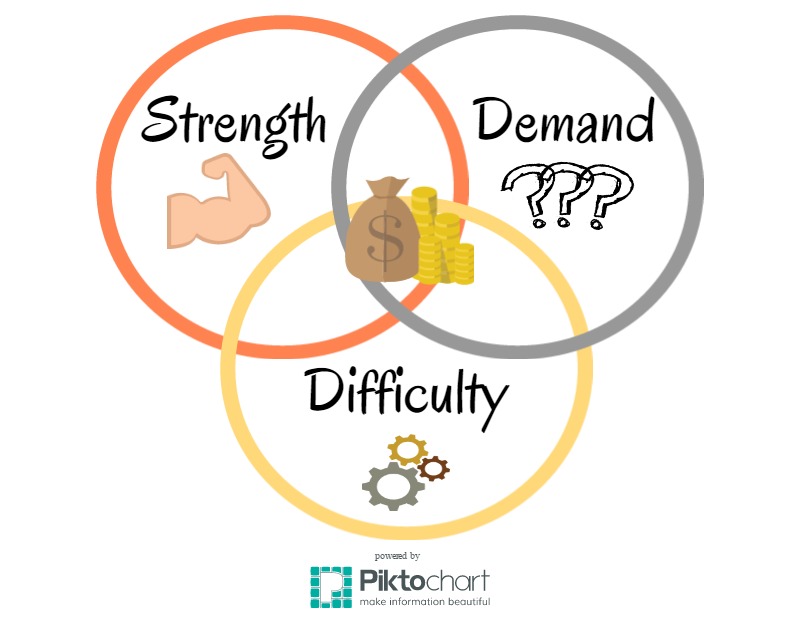 valuable skills (to generate an income. Build up a skill that’s high in demand, difficult to learn and based around your strengths. No quick-fix short-term solutions. Learn a skill that you can grow into a business later. )
valuable skills (to generate an income. Build up a skill that’s high in demand, difficult to learn and based around your strengths. No quick-fix short-term solutions. Learn a skill that you can grow into a business later. ) - Selling (It’s not because you have the knowledge required to help people/make a product that you’ll actually succeed in your business – it doesn’t mean shit if you don’t know how to relate that to others and convince others of its value. Same thing goes for dating, soliciting, making friends. Selling yourself is always a key component of a GREAT life – whether you like it or not)
- Financial intelligence (Know how to manage your own money, keep track of expenses and be able to invest it into appreciating assets when you finally start to make some. Know where to best allocate expenses and to automatically save regularly)
- Entrepreneurship/law (Know your own bookkeeping, how taxation works, insurance, social contributions/welfare system, … – life consists out of a lot of boring-ass administration. You don’t have to know everything, but when it comes to money, this will enable you to keep more of it.)
How should you learn it?
- Industry expertise & skill
- Choose 1 industry for the rest of your life. The longer you wait/doubt/fidget to choose this, the longer it’ll take to build deep domain expertise which is prerequisite for a good career. It takes increasingly more time for breakthroughs to happen in each respective field as the “base knowledge” required to just get by increases rapidly.
- Choose 1 skill that’s difficult to learn, high in demand and you have a natural advantage in it (by knowing your strengths). JUST FUCKING PICK SOMETHING AND STICK WITH IT. I recommend just skimming the job boards on LinkedIn, job advertisements in your local paper, fiverr gigs which sell really well and so-forth. Then just pick one and reverse-engineer it.
- Reading: “So good they can’t ignore you” by Cal Newport and The Recession Proof Graduate by Charlie Hoehn
- Selling
- Watch the video of Chet Holmes on education-based marketing (he’s one of the best salesman ever)
- Take up a part-time job where you sell a product/service you like or sell your own (invaluable life experience/part-time job!)
- Reading: The Ultimate Sales Machine by Chet Holmes (no-brainer)
- Financial intelligence
- Managing: Manage your money on a weekly basis by keeping a log/excel file of income and expenses, allocate most of it towards investments that bring you a return over time. Here’s an excel file I use – Finance Template (if it’s unclear, I might make a video for using it). For the love of God, please don’t waste your money on useless crap when you finally are making some decent $$$.
- Investing: I’m not an expert in investing (will be someday) but real estate rental (houses, parking lots, hotel rooms, hostels, campings), object rental (power-equipment, industrial equipment/small trucks, musical instruments, furniture), automated businesses (carwash, laundromats, tanning salons, atm’s, vending machines), content systems (ecourses, books, products, …), advertisement (billboards), portfolio (stocks, bonds, high-yield ETF’s) seem like good potential investments for almost every budget. But don’t be a fool thinking you can outsmart people who trade stocks for a living – educate yourself first before gambling away your money on the market. And then still..
- Quick math: Be able to quickly calculate percentages, make additions, subtractions, divisions and multiplications. I recommend to even review basic arithmetic like a multiplication table and do some simple mathematical exercises regularly.
- Reading: The Intelligent Investor by Benjamin Graham (this is quite possibe a very general and inaccurate recommendation since I haven’t even read it.)
- Law
- This is region/country specific most of the time and therefore I can’t give clear-cut advise on this. I suggest you just buy a standard “starting guide” book for self-employed people for you local law institution and start from there. Learn how to take advantage from taxes, the different social systems, difference between llc/c-corp and so forth. Maybe even take a course with an accountant to get to know the different ins- n outs. I did that – Definitely worth your time.
Additional reading: The Personal MBA by Josh Kaufman, HIGHLY RECOMMENDED (top 3 level)
This book taught me more practical, applicable knowledge than the last 4 years of college. 3h spent & I’m 80 pages in. Angry
3) Psychology
This is huge. By understanding the real nature of humans and more deeply understand why you/others make certain (irrational) choices you’re always one step ahead. To see the cage of our nature is to partially escape it. Here’s the crucial elements you should master;
What should you learn?
- Body language (making people feel at ease, making yourself feel better, know when girls are attracted, know when people feel upset, know how to notice tension,…)
- Conditioning, biases & learning (know how fallible your own thinking is and re-direct this in better ways, understand how humans absorb knowledge and the optimal conditions/environment for retention)
- Thinking, memory & retention (know how to improve your memory and long-term retention rate of the things you learn – Being able to learn fast (your speed) is what will separate good from GREAT people in the future.)
- Motivation & emotion (learn why humans feel certain emotions and what their uses are, how to cope with depression, anger, frustration and sadness that block you from getting what you want in life if you let them linger. Be able to bounce back (quickly) from negative emotions/situations like death from a loved one, heavy physical trauma.)
- Personality (Know the difference between temperament (inborn characteristics) and things that came from your environment. Know what factors molded who you are (and others) to make more accurate choices for the future. (ex: who to trust & under which circumstances, what career-path best suits you, what people are best suited for which tasks, …)
- Social/group psychology (know how people are essentially social animals looking to belong to a certain group. How they act in groups and how to lead/educate a group)
How should you learn it?
- Get a school textbook on standard psychology (the big 1000+ pages
 ones). Read it front to back, starting with the chapters most closely resembling the above points. Really. It’s well worth the time and will probably change your life forever.
ones). Read it front to back, starting with the chapters most closely resembling the above points. Really. It’s well worth the time and will probably change your life forever. - Check out the most commonly used human fallacies on wikipedia. It’s a GREAT resource.
- Make an IF>THEN plan for regular annoying emotions that block you from getting what you want.
- Make an audio-tape for brainwashing yourself for greatness and play this every morning and every evening.
- Get more expansive books/PDF’s on the different subsets of psychology like body language, learning faster (see next), retaining information, personality profiling and sociology/influencing.
4) Optimal Learning
Now this is a bit more interesting! Optimal learning will allow you to soak up new strategies to increase your life quality at maximum efficiency. And although the brain is incredibly inefficient at remembering let alone learning a new pattern you should definitely maximize your learning ability. This is the only skill of EVERYTHING on this list that I’d recommend to maximize instead of optimizing. Here’s the core everyone should master;
What should you learn?
- How to learn new skills optimally
- How to optimally read a book/information, summarize it & recollect the essential knowledge in it when you need it.
- How to focus, prioritize and eliminate distractions (we live in an attention economy where people are constantly bombarded with ads, things that grab you attention/entertain you without adding substantial life value. People who can capitalize on deeply focused time are the (only?) ones who’ll excel in the coming decades.) How many links have you clicked on in this article so far?
How should you learn it?
- Skill learning
- I might write a deeper post about this in the near future, but for now I’ll just link to several good resources on skill acquisition like Tim Ferriss’s method (9:40) & Josh Kaufman (9:30). Here’s a summary of how I would approach it;
- Book/information reading (you need a sort of framework for absorbing and filtering key information and repeating the most essential on a regular basis. I’ve written a post in this in the past and Ludvig from SGM also made a great entry on this recently.
- SMART-Learning
- Ludvigs Framework for learning
- Here’s another small overview of how I select, summarize and aim to retain information anno 2016. Here’s a example of a recent book summary to get a clearer picture.
How I Select My Next Books To Read
How I Summarize The Books I’ve Read (Checklist Of Questions + General Outline)
CTM = Commit To Memory And Review Essentials Using Recall
- Focusing, prioritizing and eliminating distractions. Read Deep Work by Cal Newport and The One Thing by Gary Keller.
Here’s a small bonus;
5) Specific Multipliers
Now that we’ve had the biggest areas you should be tackling that will be life-critical. Here are the next ones you should be tackling on the side as quickly as possible and should NOT be underestimated in importance.
- Public speaking –> Allows you to quickly rise through the ranks as a leader when you’re able to explain your vision in accurate detail without flinching in front of a big crowd. I believe the ability to make your ideas clearly heard can mean the difference between a management position and a regular job. Use toastmasters or make YouTube video’s to practice them. No-one was born a miracle.
- Dating –> Women are NOT going to come knocking on your door. Life never gives you what you want, it just sometimes gives you what you work incredibly hard for. If you want a high quality girl or just plain sex, it’s up to you to get out there and get whatever the fuck you want. Do x number of approaches a week/evening, ask them out on dates and Read Models by Mark Manson. Become a man worthy of dating through self-development. Don’t settle for committed relationships before your 30’s, because it’s easier to get constant sex. And never get married, there’s 0 benefits in that for a man.
- Health, style & grooming –> Carve out some time in your weeks for at least 3 hours of strength training (this is a negligible amount for the health ROI), dressing well each morning with simple clothing (see my life guide for style advice) and taking care of regular hygiene. This is inexcusable.
Essence
The difference between the person you are right now and the people you admire is simply the books they’ve read. Don’t worry about all the book recommendations and the “time-pressure” I’ve outlined in this article. By the time you’re 30, you’ll have read almost every book on the planet if you’re consistent in following this path (which I believe you will).
You’ll probably be working at full capacity anyway – otherwise you wouldn’t have read this far.
There’s nothing grand or special about rising through the societal ranks, all it takes is;
- A more accurate image of reality
- A clarity of what needs to be done.
This post has given both.
All that’s left is action.
Realize it’s a marathon and not a sprint and that these skills will take a lifetime to master. Just do the best with what is currently available and try to strike a (difficult) balance between self-improvement and self-acceptance. I believe a regular appreciation ritual provides a nice equilibrium between the two.
What other essential life skills am I missing here?
Note: Here’s what Josh Kaufman considers the most important skills to know: https://joshkaufman.net/what-must-an-educated-person-know/
NoteNote: Take in mind that I’m a 22 year-old college student and my views could be highly inaccurate. Just over the years I’ve grown to trust only my own judgment by (accurately?) analyzing the world around me and making decisions based on that information. I realize some views expressed here are radical at times and I often doubt their accuracy (which is a good thing).
They are – however – still standing at the moment. I am always open to contrary evidence and better approaches to life and handle feedback really well. Despite that – I might not find it the best use of my time and energy to debate with/convince you of the accuracy of this information on this blog. I do respect your opinion and believe everyone has a right to have one and voice it.
NoteNoteNote: I’m also a fallible human being, retarded in more ways than you might think and highly-likely to be wrong on many of the things I say. I haven’t mastered all of these essential life skills yet and simply put out the best advice I can give based on current advice. Don’t ascribe superhuman abilities to random people based on what you’ve read about them on the internet.
——————————————————–
I love my blogging monologue to vent ideas without opposition. Leave your (most-likely) very witty and intelligent brain-farts in the section below and I’ll be sure to respond whenever I carve out time out of my anally regimented schedule!
3 things;
- Song recommendation: Been high writing on this
- Question: Does anyone know any community-submitted forum where accomplished people from all walks in life (health, wealth and love) give advice on which strategy one should follow to achieve similar results? One without self-advertising their spammy shitproducts like quora tends to do?
- Parting thoughts: Problems in life come one-by-one, just like only one grain of sand passes through the hourglass at a time.
Toudelou,
Simon
